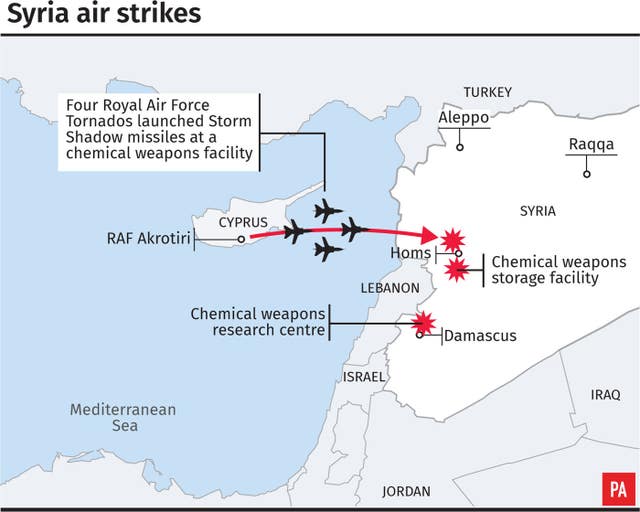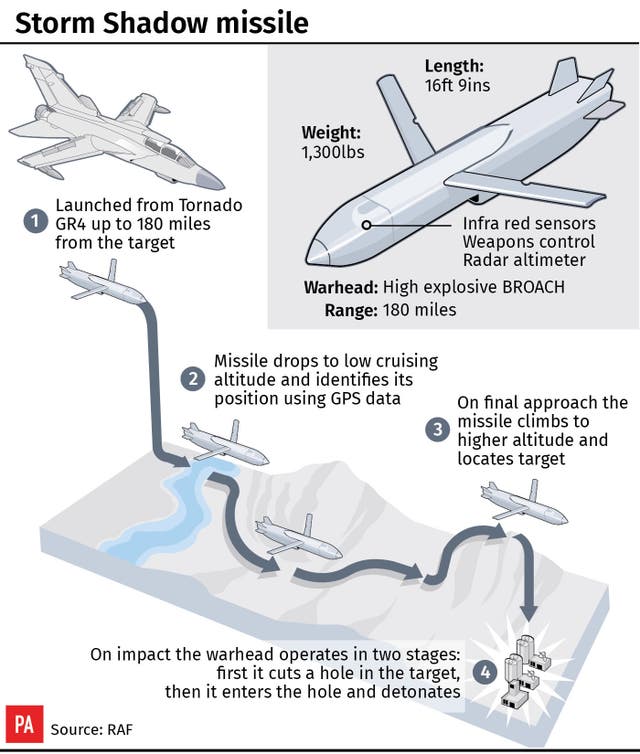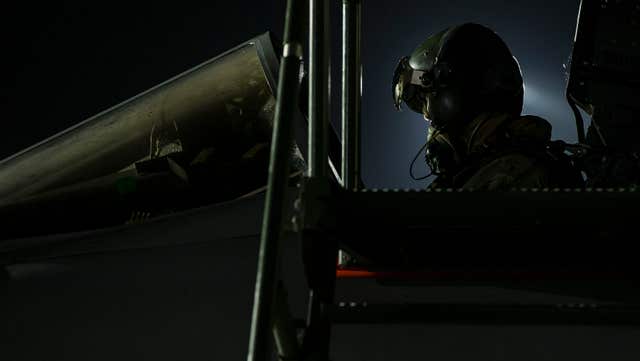
A series of missile strikes have been launched against Syria by the US, UK and France – as Russia warned that the allies’ intervention “will not be left without consequences”.
Three waves of overnight strikes destroyed important infrastructure at sites connected with the Syrian regime’s chemical weapons programme.
British Tornado GR4s departed from RAF Akrotiri in Cyprus and fired Storm Shadow missiles at a military facility near Homs, where the regime is said to have kept chemical weapon precursors.
Other sites near Damascus were also targeted in the assault which US Defence Secretary Jim Mattis called a “one-time shot”.
 (PA Graphics)
(PA Graphics)
Nato secretary-general Jens Stoltenberg is among those to have backed the intervention – saying “the use of chemical weapons is unacceptable, and those responsible must be held accountable” – while the Russian ambassador in Washington, Anatoly Antonov, said: “We are being threatened. We warned that such actions will not be left without consequences.”
Syria’s main backer, Russia, which has insisted there was no chemical weapons attack in Douma and accused the West of fabricating evidence of it, was not informed of the strikes in advance, according to the US.
However, French Defence Minister Florence Parly said the Russians were warned “ahead of time”.
 Syrian air defences responded to the joint strikes by the United States, France and Britain (Sana/AP)
Syrian air defences responded to the joint strikes by the United States, France and Britain (Sana/AP)
The strikes were met with limited resistance in the form of Syrian surface-to-air missiles and the country’s state TV said three civilians were wounded near the military base in Homs. There were no reports of any allied losses during the strikes.
Announcing the operation, Prime Minister Theresa May said there was “no practicable alternative to the use of force”.
The Prime Minister @theresa_may has made a statement on Syria: https://t.co/bBfYyowUIo pic.twitter.com/QlTeFXmOkt
— UK Prime Minister (@10DowningStreet) April 14, 2018
Mrs May said “every possible diplomatic channel” had been explored before authorising the strikes, adding that it was not a decision she had taken lightly.
She said: “This persistent pattern of behaviour must be stopped – not just to protect innocent people in Syria from the horrific deaths and casualties caused by chemical weapons but also because we cannot allow the erosion of the international norm that prevents the use of these weapons.
“This is not about intervening in a civil war. It is not about regime change.”
 A factfile on the Storm Shadow missiles (PA Graphics)
A factfile on the Storm Shadow missiles (PA Graphics)
US President Donald Trump said the Syrian regime’s use of chemical weapons on Douma last Saturday was a “significant escalation in a pattern of chemical weapons use by that very terrible regime”.
— Donald J. Trump (@realDonaldTrump) April 14, 2018
Giving a statement at the White House, Mr Trump said: “This evil and despicable act left mothers and fathers, infants and children thrashing in pain and gasping for air.
“The combined American, British and French response will integrate all instruments of our national power.”
Mrs May said the action would also send a “clear signal” to anyone else who believed they could use chemical weapons “with impunity”.
She said: “This is the first time as Prime Minister that I have had to take the decision to commit our armed forces in combat – and it is not a decision I have taken lightly.”
Mrs May authorised the strikes despite demands from opposition parties that Parliament was consulted before any military action was launched.
The PM has engaged UK forces in gesture bombing, with no major international consensus and no long term plan to halt the use of chemical weapons or deliver peace. Most worrying, is that she has acted at the behest of presidential tweets and sidelined parliament. https://t.co/GVv2PkEHiM
— Stewart McDonald MP (@StewartMcDonald) April 14, 2018
Stewart McDonald, the SNP spokesman for defence, said joining in an allied attack on Syria was “not a brave or strong” decision by Mrs May.
He wrote on Twitter: “The PM has engaged UK forces in gesture bombing, with no major international consensus and no long term plan to halt the use of chemical weapons or deliver peace.
“Most worrying is that she has acted at the behest of presidential tweets and sidelined Parliament.”
Dozens of men, women and children were massacred using chemical weapons in Douma on Saturday, 7 April. The red line has been crossed. I have therefore ordered the French armed forces to intervene.https://t.co/mezFfV1Hh9 pic.twitter.com/7lVhMjhx9I
— Emmanuel Macron (@EmmanuelMacron) April 14, 2018
French President Emmanuel Macron said there was no doubt the Syrian regime was responsible for the chemical attack in Douma.
“The red line set by France in May 2017 has been crossed,” he added.
 Jim Mattis said the strikes were a ‘one-time shot’ (Carolyn Kaster/AP)
Jim Mattis said the strikes were a ‘one-time shot’ (Carolyn Kaster/AP)
General Joseph Dunford, chairman of the US Joint Chiefs of Staff, told reporters at a Pentagon briefing that the first of the allied strikes on Saturday was at a scientific research centre in greater Damascus involved in the development and production of chemical weapons.
The second was at a chemical weapons storage facility west of Homs, while the third was at a chemical equipment storage facility and important command post.
He added: “Important infrastructure was destroyed which will result in a setback for the Syrian regime. They will lose years of research and development, storage and equipment.”
 RAF Tornado pilots conducted a series of missile strikes (Cpl L Matthews/MoD/PA)
RAF Tornado pilots conducted a series of missile strikes (Cpl L Matthews/MoD/PA)
General Dunford said the strike had inflicted maximum damage without unnecessary risk to civilians.
Asked if the US and its allies would continue military operations, he said: “That will depend on Mr Assad should he decide to use more chemical weapons in the future, and of course the powers that have signed the Chemical Weapons Prohibition (Organisation for the Prohibition of Chemical Weapons) have every reason to challenge Assad should he choose to violate that.
“But right now this is a one-time shot and I believe that it sent a very strong message to dissuade him, to deter him from doing this again.”
Mr Mattis said the US remained in “close consultation” with its allies, adding: “We review the evidence all the time. But right now we have no additional attacks planned.”


Why are you making commenting on The Herald only available to subscribers?
It should have been a safe space for informed debate, somewhere for readers to discuss issues around the biggest stories of the day, but all too often the below the line comments on most websites have become bogged down by off-topic discussions and abuse.
heraldscotland.com is tackling this problem by allowing only subscribers to comment.
We are doing this to improve the experience for our loyal readers and we believe it will reduce the ability of trolls and troublemakers, who occasionally find their way onto our site, to abuse our journalists and readers. We also hope it will help the comments section fulfil its promise as a part of Scotland's conversation with itself.
We are lucky at The Herald. We are read by an informed, educated readership who can add their knowledge and insights to our stories.
That is invaluable.
We are making the subscriber-only change to support our valued readers, who tell us they don't want the site cluttered up with irrelevant comments, untruths and abuse.
In the past, the journalist’s job was to collect and distribute information to the audience. Technology means that readers can shape a discussion. We look forward to hearing from you on heraldscotland.com
Comments & Moderation
Readers’ comments: You are personally liable for the content of any comments you upload to this website, so please act responsibly. We do not pre-moderate or monitor readers’ comments appearing on our websites, but we do post-moderate in response to complaints we receive or otherwise when a potential problem comes to our attention. You can make a complaint by using the ‘report this post’ link . We may then apply our discretion under the user terms to amend or delete comments.
Post moderation is undertaken full-time 9am-6pm on weekdays, and on a part-time basis outwith those hours.
Read the rules hereLast Updated:
Report this comment Cancel